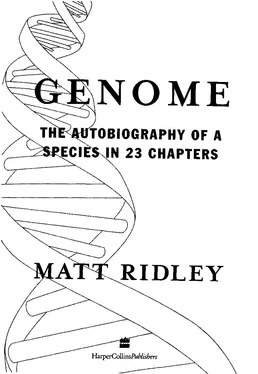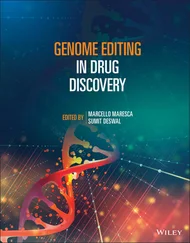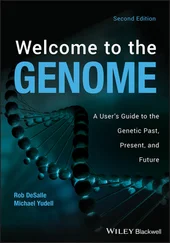Genome - Matt Ridley
Здесь есть возможность читать онлайн «Genome - Matt Ridley» — ознакомительный отрывок электронной книги совершенно бесплатно, а после прочтения отрывка купить полную версию. В некоторых случаях можно слушать аудио, скачать через торрент в формате fb2 и присутствует краткое содержание. Жанр: Старинная литература, на английском языке. Описание произведения, (предисловие) а так же отзывы посетителей доступны на портале библиотеки ЛибКат.
- Название:Matt Ridley
- Автор:
- Жанр:
- Год:неизвестен
- ISBN:нет данных
- Рейтинг книги:5 / 5. Голосов: 1
-
Избранное:Добавить в избранное
- Отзывы:
-
Ваша оценка:
- 100
- 1
- 2
- 3
- 4
- 5
Matt Ridley: краткое содержание, описание и аннотация
Предлагаем к чтению аннотацию, описание, краткое содержание или предисловие (зависит от того, что написал сам автор книги «Matt Ridley»). Если вы не нашли необходимую информацию о книге — напишите в комментариях, мы постараемся отыскать её.
Matt Ridley — читать онлайн ознакомительный отрывок
Ниже представлен текст книги, разбитый по страницам. Система сохранения места последней прочитанной страницы, позволяет с удобством читать онлайн бесплатно книгу «Matt Ridley», без необходимости каждый раз заново искать на чём Вы остановились. Поставьте закладку, и сможете в любой момент перейти на страницу, на которой закончили чтение.
Интервал:
Закладка:
Chomsky's conjecture has been brilliantly vindicated in the succeeding decades by lines of evidence from many different disciplines.
9 4 G E N O M E
All converge upon the conclusion that to learn a human language requires, in the words of the psycho-linguist Steven Pinker, a human language instinct. Pinker (who has been called the first linguist capable of writing readable prose) persuasively gathered the strands of evidence for the innateness of language skills. There is first the universality of language. All human people speak languages of comparable grammatical complexity, even those isolated in the highlands of New Guinea since the Stone Age. All people are as consistent and careful in following implicit grammatical rules, even those without education and who speak what are patronisingly thought to be 'slang'
dialects. The rules of inner-city black Ebonics are just as rational as the rules of the Queen's English. To prefer one to another is mere prejudice. For example, to use double negatives ('Don't nobody do this to me . . .') is considered proper in French, but slang in English.
The rule is just as consistently followed in each.
Second, if these rules were learnt by imitation like the vocabulary, then why would four-year-olds who have been happily using the word 'went' for a year or so, suddenly start saying 'goed'? The truth is that although we must teach our children to read and write —
skills for which there is no specialised instinct — they learn to speak by themselves at a much younger age with the least of help from us. No parent uses the word 'goed', yet most children do at some time. No parent explains that the word 'cup' refers to all cup-like objects, not this one particular cup, nor just its handle, nor the material from which it is made, nor the action of pointing to a cup, nor the abstract concept of cupness, nor the size or temperature of cups. A computer that was required to learn language would have to be laboriously equipped with a program that ignored all these foolish options — with an instinct, in other words. Children come pre-programmed, innately constrained to make only certain kinds of guess.
But the most startling evidence for a language instinct comes from a series of natural experiments in which children imposed grammatical rules upon languages that lacked them. In the most famous case, studied by Derek Bickerton, a group of foreign labour-ers brought together on Hawaii in the nineteenth century developed I N S T I N C T 9 5
a pidgin language - a mixture of words and phrases whereby they could communicate with each other. Like most such pidgins, the language lacked consistent grammatical rules and remained both laboriously complex in the way it had to express things and relatively simple in what it could express. But all that changed when for the first time a generation of children learnt the language in their youth.
The pidgin acquired rules of inflection, word order and grammar that made it a far more efficient and effective language - a creole.
In short, as Bickerton concluded, pidgins become Creoles only after they are learnt by a generation of children, who bring instinct to bear on their transformation.
Bickerton's hypothesis has received remarkable support from the study of sign language. In one case, in Nicaragua, special schools for the deaf, established for the first time in the 1980s, led to the invention, de novo, of a whole new language. The schools taught lip-reading with little success, but in the playground the children brought together the various hand signs they used at home and established a crude pidgin language. Within a few years, as younger children learnt this pidgin, it was transformed into a true sign language with all the complexity, economy, efficiency and grammar of a spoken language. Once again, it was children who made the language, a fact that seems to suggest that the language instinct is one that is switched off as the child reaches adulthood. This accounts for our difficulty in learning new languages, or even new accents, as adults. We no longer have the instinct. (It also explains why it is so much harder, even for a child, to learn French in a classroom than on holiday in France: the instinct works on speech that it hears, not rules that it memorises.) A sensitive period during which something can be learnt, and outside which it cannot, is a feature of many animals' instincts. For instance, a chaffinch will only learn the true song of its species if exposed to examples between certain ages. That the same is true of human beings was proved in a brutal way by the true story of Genie, a girl discovered in a Los Angeles apartment aged thirteen. She had been kept in a single sparsely furnished room all her life and deprived of almost all human contact.
9 6 G E N O M E
She had learnt two words, 'Stopit' and 'Nomore'. After her release from this hell she rapidly acquired a larger vocabulary, but she never learnt to handle grammar - she had passed the sensitive period when the instinct is expressed.
Yet even bad ideas take a lot of killing, and the notion that language is a form of culture that can shape the brain, rather than vice versa, has been an inordinate time a-dying. Even though the canonical case histories, like the lack of a concept of time in the Hopi language and hence in Hopi thought, have been exposed as simple frauds, the notion that language is a cause rather than consequence of the human brain's wiring survives in many social sciences. It would be absurd to argue that only Germans can understand the concept of taking pleasure at another's misfortune; and that the rest of us, not having a word for Schadenfreude, find the concept entirely foreign.2
Further evidence for the language instinct comes from many sources, not least from detailed studies of the ways in which children develop language in their second year of life. Irrespective of how much they are spoken to directly, or coached in the use of words, children develop language skills in a predictable order and pattern.
And the tendency to develop language late has been demonstrated by twin studies to be highly heritable. Yet for many people the most persuasive evidence for the language instinct comes from the hard sciences: neurology and genetics. It is hard 'to argue with stroke victims and real genes. The same part of the brain is consistently used for language processing (in most people, on the left side of the brain), even the deaf who 'speak' with their hands, though sign language also uses part of the right hemisphere.3
If a particular one of these parts of the brain is damaged, the effect is known as Broca's aphasia, an inability to use or understand all but the simplest grammar, even though the ability to understand sense remains unaffected. For instance, a Broca's aphasic can easily answer questions such as 'Do you use a hammer for cutting?' but has great difficulty with: 'The lion was killed by the tiger. Which one is dead?' The second question requires sensitivity to the grammar I N S T I N C T 9 7
encoded in word order, which is known by just this one part of the brain. Damage to another area, Wernicke's area, has almost the opposite effect - people with such damage produce a rich but senseless stream of words. It appears as if Broca's area generates speech and Wernicke's area instructs Broca's area what speech to generate. This is not the whole story, for there are other areas active in language processing, notably the insula (which may be the region that malfunctions in dyslexia).4
There are two genetic conditions that affect linguistic ability. One is Williams syndrome, caused by a change in a gene on chromosome 11, in which affected children are very low in general intelligence, but have a vivid, rich and loquacious addiction to using language.
They chatter on, using long words, long sentences and elaborate syntax. If asked to refer to an animal, they are as likely to choose something bizarre like an aardvark as a cat or a dog. They have a heightened ability to learn language but at the expense of sense: they are severely mentally retarded. Their existence seems to undermine the notion, which most of us have at one time or another considered, that reason is a form of silent language.
Читать дальшеИнтервал:
Закладка:
Похожие книги на «Matt Ridley»
Представляем Вашему вниманию похожие книги на «Matt Ridley» списком для выбора. Мы отобрали схожую по названию и смыслу литературу в надежде предоставить читателям больше вариантов отыскать новые, интересные, ещё непрочитанные произведения.
Обсуждение, отзывы о книге «Matt Ridley» и просто собственные мнения читателей. Оставьте ваши комментарии, напишите, что Вы думаете о произведении, его смысле или главных героях. Укажите что конкретно понравилось, а что нет, и почему Вы так считаете.












